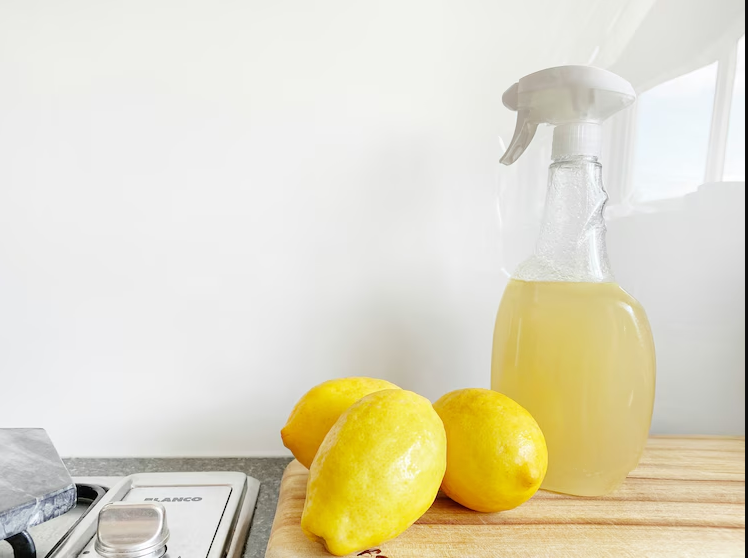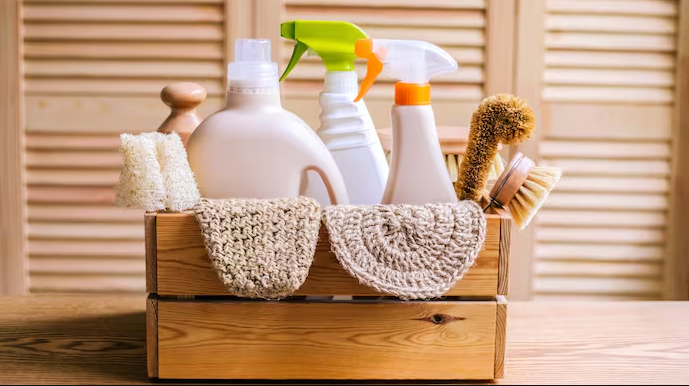A recent study shows ‘quats’ present in our cleaning products can be ‘potentially toxic’ to a type of brain cell.
Cleaning can be therapy for many of us, and sometimes, looking at that clean countertop or tackling the corner of your room that you’ve been avoiding for days can be all you need to calm your brain.
However, what if we told you that studies have shown that the cleaning products you’ve been using may contain a ‘brain-altering chemical’?
You read that right.
What is this study?
Various studies have shown that a certain compound found in almost all of your cleaning products can harm your body. This compound is called quaternary ammonium compounds, aka “quats”. To simply put, quats belong to a category of chemicals found in certain households of our cleaning products. To be precise, quat is found in cleaning products, hand sanitisers, personal care products, and many kinds of wipes (surface, baby, hand, and disinfecting wipes).

How do they work?
Quats are known to eliminate viruses, bacteria, and other microbes by disrupting their cell membrane. But, several studies say that quats might be harmful to us.
Have a look at some of them:
A 2023 study shows that exposure to quats has been associated with asthma and an increased risk of chronic obstructive pulmonary disease in humans. Another recent study that was published in Nature.com, shows that these quats can be “potentially toxic” to a type of brain cell called oligodendrocytes, which can aid in transmitting neural signals through our brain faster. “We’re not looking to say that there’s a direct correlation between exposure and human neurodevelopmental issues. We don’t have that data yet. But we have fundamentally shown, very rigorously, that oligodendrocytes have a specific vulnerability to these chemicals,” said Paul Tesar, the director of the Institute for Glial Sciences at Case Western Reserve and the principal investigator of the study.
What do experts have to say?
Dr Ravi Kumar, a consultant of paediatric neurology at Aster CMI Hospital, Bangalore, agrees with the study.
He says, “When exposed to quats, these cells (oligodendrocytes) die or fail to mature, potentially impacting nerve signal transmission and overall brain function. The concern is particularly relevant for children as their brains are still developing, making them more vulnerable to environmental toxins.”
Do we have quats in our cleaning product in India?
Dr Kunal Bahrani, the director of neurology at Fortis, Faridabad, further agrees with the study and tells India Today that while the research is ongoing, it’s worth exploring, especially considering how prevalent these products are in Indian households.
He further explains that in India, cleaning product labels are regulated by the Bureau of Indian Standards (BIS).
“While BIS mandates listing ingredients, the specific concentration of quats might not be explicitly mentioned. This makes it difficult for consumers to gauge potential risks,” Dr Bharani says.
What You Can Do?
Now, before you go into a panic mode and start checking the label of your cleaning product right away, here’s some help:
Check the label Dr Bahrani suggests that while buying a cleaning product we should opt for cleaning products labelled “quat-free” or with natural disinfectants like vinegar or diluted bleach. Now, since there are tons of ingredients, a simple Google search might also help you with this (while buying the product). “Look for “cationic surfactants” on labels. This is a broader term that often includes QACs,” Dr Bahrani says. These ‘cationic surfactants’ are compounds that generally end with ‘ammonium chloride’ or ‘omium chloride’.
For instance, Cetrimonium Bromide, also known as cetyltrimethylammonium bromide, is a kind of quat that can be found in some surfactants and detergents.
Ventilate your house While using these cleaning products, remember to open windows to minimise inhalation of fumes.
Natural is the best Dr Ravi Kumar advised us to clean with natural disinfectants like vinegar or diluted bleach, which can be better for us.
Remember
We need more research to confirm the link between QACs and human brain health. However, the potential risk highlights the importance of using cleaning products cautiously and opting for natural alternatives whenever possible.
Be cautious about what you bring into your home, especially when it comes to products used in cleaning and sanitizing. Your health, and that of your loved ones, could depend on it.





